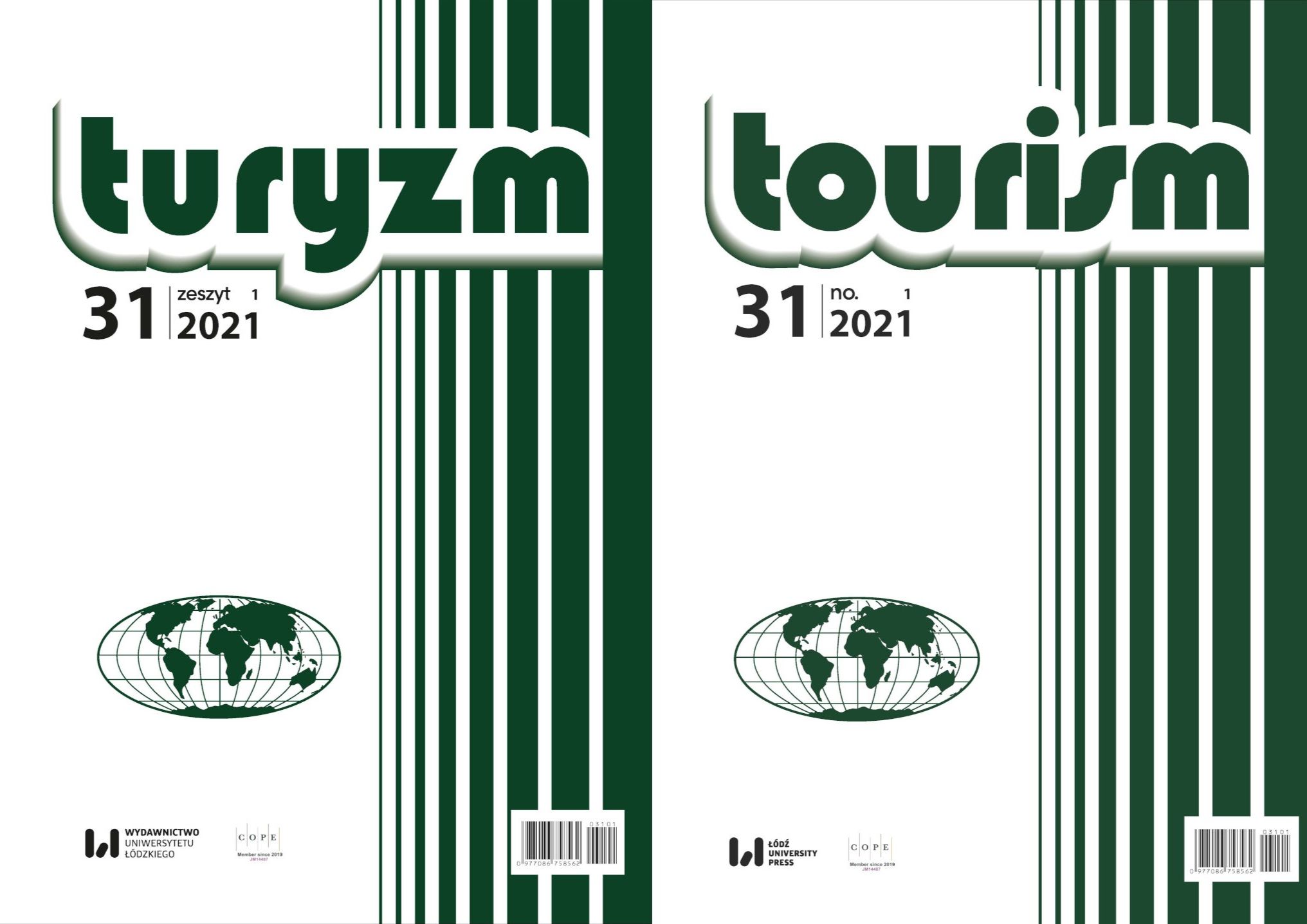Has COVID-19 brought a temporary halt to overtourism?
DOI:
https://doi.org/10.18778/0867-5856.31.1.20Keywords:
COVID-19, overtourism, zero tourism, responsible behaviour, sustainable tourismAbstract
COVID-19 has caused radical changes in the lives of people as well as economies. These changes are deemed as evolutionary and would bring a new phase of transformation. However, current practices of both people and businesses might cease once the crisis disappears. In the tourism context, going back to unsustainable and irresponsible practices would lead to the re-emergence of tourism aversion. This research note addresses the possibility that COVID-19 has only brought a temporary halt to the pre-existing issue of over-tourism and its related unsustainable practices. Even though the travel restrictions imposed by several countries amidst the spread of coronavirus have created a situation of “zero tourism”, the tourism sector has now resumed its operations in most of the world. By presenting a conceptual framework, this note stresses that if the sector continues to act in the same way as before the virus, the situation of overtourism will re-emerge in the post-COVID-19 phase. Therefore, to prevent this issue, emphasising quality tourism, inculcating responsible behaviour, and the incorporation of technology are suggested.
Downloads
References
Benner, M. (2019). From overtourism to sustainability: A research agenda for qualitative tourism development in the Adriatic. Zeitschrift für Wirtschaftsgeographie = German Journal of Economic Geography, 2 (64), 74–87.
Google Scholar
DOI: https://doi.org/10.1515/zfw-2019-0016
Benner, M. (2020). The decline of tourist destinations: An evolutionary perspective on overtourism. Sustainability, 12 (9), 3653. https://doi.org/10.3390/su12093653
Google Scholar
DOI: https://doi.org/10.3390/su12093653
Bertocchi, D., Camatti, N., Giove, S., van der Borg, J. (2020). Venice and overtourism: Simulating sustainable development scenarios through a tourism carrying capacity model. Sustainability, 12 (2), 512. https://doi.org/10.3390/su12020512
Google Scholar
DOI: https://doi.org/10.3390/su12020512
Brouder, P. (2020). Reset redux: Possible evolutionary pathways towards the transformation of tourism in a COVID-19 world. Tourism Geographies, 22 (3), 484–490. https://doi.org/10.1080/14616688.2020.1760928
Google Scholar
DOI: https://doi.org/10.1080/14616688.2020.1760928
Brouder, P., Teoh, S., Salazar, N.B., Mostafanezhad, M., Pung, J.M., Lapointe, D., Clausen, H.B. (2020). Reflections and discussions: Tourism matters in the new normal post COVID-19. Tourism Geographies, 22 (3), 1–12, 735–746. https://doi.org/10.1080/14616688.2020.1770325
Google Scholar
DOI: https://doi.org/10.1080/14616688.2020.1770325
Butler, R. (2020). From too many to too few: The impact of COVID-19 on overtourism. Retrieved from: https://blog.cabi.org/2020/06/02/from-too-many-to-too-few-the-impact-of-covid-19-on-overtourism/ (12.09.2020).
Google Scholar
Butler, R.W. (1980). The concept of a tourist area cycle of evolution: Implications for management of resources change on a remote island over half a century view project. Canadian Geographer, XXIV (1), 5–12. https://doi.org/10.1111/j.1541-0064.1980.tb00970.x
Google Scholar
DOI: https://doi.org/10.1111/j.1541-0064.1980.tb00970.x
Butler, R.W. (2019). Tourism carrying capacity research: A perspective article. Tourism Review, 75 (1), 207–211. https://doi.org/10.1108/TR-05-2019-0194
Google Scholar
DOI: https://doi.org/10.1108/TR-05-2019-0194
Doxey, G.V. (1975). A causation theory of visitor-resident irritants: Methodology and research inferences. Sixth Annual TTRA Conference.
Google Scholar
Fanthorpe, H. (2020). Could Covid-19 be the end of overtourism? Retrieved from: https://www.roughguides.com/article/could-covid-19-be-the-end-of-overtourism/ (13.09.2020).
Google Scholar
Farmaki, A. (2020). Memory and forgetfulness in tourism crisis research. Tourism Management, 83, 104210. https://doi.org/10.1016/j.tourman.2020.104210
Google Scholar
DOI: https://doi.org/10.1016/j.tourman.2020.104210
Goodwin, H. (2017). The challenge of overtourism. Responsible Tourism Partnership Working Paper, 4. Retrieved from: http://haroldgoodwin.info/pubs/RTP’WP4Overtourism01’2017.pdf (12.07.2020).
Google Scholar
Hospers, G.J. (2019). Overtourism in European cities: From challenges to coping strategies. CESifo Forum, 20 (3), 20–24.
Google Scholar
Hughes, N. (2018). ‘Tourists go home’: Anti-tourism industry protest in Barcelona. Social Movement Studies, 17 (4), 471–477. https://doi.org/10.1080/14742837.2018.1468244
Google Scholar
DOI: https://doi.org/10.1080/14742837.2018.1468244
Koens, K., Postma, A. (2018). Understanding and managing visitor pressure in urban tourism. Retrieved from: https://www.celth.nl/sites/default/files/2018-09/Voorkomen%20van%20bezoekersdruk%20in%20Europese%20steden.pdf (17.03.2020).
Google Scholar
Kuo, L. (2020). China promotes ‘revenge travel’ to boost economy after Covid lockdowns. Retrieved from: https://www.theguardian.com/world/2020/oct/01/china-promotes-revenge-travel-boost-economy-coronavirus-golden-week (2.10.2020).
Google Scholar
Kuščer, K., Mihalič, T. (2019). Residents’ attitudes towards overtourism from the perspective of tourism impacts and cooperation – the case of Ljubljana. Sustainability, 11 (6), 1823. https://doi.org/10.3390/su11061823
Google Scholar
DOI: https://doi.org/10.3390/su11061823
Lapointe, D. (2020). Reconnecting tourism after COVID-19: The paradox of alterity in tourism areas. Tourism Geographies, 22 (3), 633–638. https://doi.org/10.1080/14616688.2020.1762115
Google Scholar
DOI: https://doi.org/10.1080/14616688.2020.1762115
Milano, C., Novelli, M., Cheer, J.M. (2019). Overtourism and tourismphobia: A journey through four decades of tourism development, planning and local concerns. Tourism Planning and Development, 16 (4), 353–357. https://doi.org/10.1080/21568316.2019.1599604
Google Scholar
Muhammad, S., Long, X., Salman, M. (2020). COVID-19 pandemic and environmental pollution: A blessing in disguise? Science of the Total Environment, 728, 138820. https://doi.org/10.1016/j.scitotenv.2020.138820
Google Scholar
DOI: https://doi.org/10.1016/j.scitotenv.2020.138820
Muler Gonzalez, V., Coromina, L., Galí, N. (2018). Overtourism: Residents’ perceptions of tourism impact as an indicator of resident social carrying capacity – case study of a Spanish heritage town. Tourism Review, 73 (3), 277–296. https://doi.org/10.1108/TR-08-2017-0138
Google Scholar
DOI: https://doi.org/10.1108/TR-08-2017-0138
Murzyn-Kupisz, M., Holuj, D. (2020). Museums and coping with overtourism. Sustainability (Switzerland), 12 (5). https://doi.org/10.3390/su12052054
Google Scholar
DOI: https://doi.org/10.3390/su12052054
Peeters, P., Gössling, S., Klijs, J., Milano, C., Novelli, M., Dijkmans, C., Eijgelaar, E., Hartman, S., Heslinga, J., Isaac, R., Mitas, O., Moretti, S., Nawijn, J., Papp, B., Postma, A. (2018). Research for TRAN Committee – Overtourism: Impact and possible policy responses. European Parliament, Policy Department for Structural and Cohesion Policies, Brussels. Retrieved from: http://www.europarl.europa.eu/thinktank/en/document.html?reference=IPOL_STU(2018)629184 (8.07.2020).
Google Scholar
Perkumienė, D., Pranskūnienė, R. (2019). Overtourism: Between the right to travel and residents’ rights. Sustainability, 11 (7), 1–17. https://doi.org/10.3390/su11072138
Google Scholar
DOI: https://doi.org/10.3390/su11072138
Pizam, A. (1978). Tourism’s impacts: The social costs to the destination community as perceived by its residents. Journal of Travel Research, 16 (4), 8–12. https://doi.org/10.1177/004728757801600402
Google Scholar
DOI: https://doi.org/10.1177/004728757801600402
Seraphin, H., Ivanov, S. (2020). Overtourism: A revenue management perspective. Journal of Revenue and Pricing Management, 19 (3), 146–150. https://doi.org/10.1057/s41272-020-00241-7
Google Scholar
DOI: https://doi.org/10.1057/s41272-020-00241-7
Tiwari, P., Kainthola, S., Chowdhary, N.R. (2020a). Demarketing: A marketing framework for overtourism. In: C. Ribeiro de Almeida, A. Quintano, M. Simancas, R. Huete, Z. Breda (eds), Handbook of research on the impacts, challenges, and policy responses to overtourism (pp. 94–114). London: IGI Global. https://doi.org/10.4018/978-1-7998-2224-0.ch006
Google Scholar
DOI: https://doi.org/10.4018/978-1-7998-2224-0.ch006
Tiwari, P., Kainthola, S., Chowdhary, N.R. (2020b). Empowering tourism education as a destination management tool. In: H. Seraphin, A. Yallop (eds), Overtourism and tourism education (pp. 63–80). London: Routledge.
Google Scholar
DOI: https://doi.org/10.4324/9781003031765-7
Tomes, N. (2010). “Destroyer and teacher”: Managing the masses during the 1918–1919 influenza pandemic. Public Health Reports, 125 (3), 48–62. https://doi.org/10.1177/00333549101250s308
Google Scholar
DOI: https://doi.org/10.1177/00333549101250S308
Wall, G. (2020). From carrying capacity to overtourism: A perspective article. Tourism Review, 75 (1), 212–215. https://doi.org/10.1108/TR-08-2019-0356
Google Scholar
DOI: https://doi.org/10.1108/TR-08-2019-0356
Weber, F., Stettler, J., Priskin, J., Rosenberg-Taufer, B., Ponnapureddy, S., Fux, S., Camp, M.A., Barth, M., Klemmer, L., Gross, S. (2017). Tourism destinations under pressure. WorkingPaper. Lucerne University of Applied Sciences and Arts, Luzern. Retrieved from: https://static1.squarespace.com/static/56dacbc6d210b821510cf939/t/5909cb282e69cf1c85253749/1493814076440/WTFL_study12017_full1version.pdf (12.07.2020).
Google Scholar
World Tourism Organization (2004). Indicators of sustainable development for tourism destinations. In: Tourism’s potential as a sustainable development strategy. Proceedings from the 2004 WTO tourism policy forum at the George Washington University, Washington, DC, USA: WTO.
Google Scholar
World Travel and Tourism Council (2020). Leading global protocols for the new normal. (May). https://doi.org/10.1017/CBO9781107415324.004 Retrieved from: https://wttc.org/COVID-19/Safe-Travels-Global-Protocols-Stamp (12.07.2020).
Google Scholar
Zenker, S., Kock, F. (2020). The coronavirus pandemic – a critical discussion of a tourism research agenda. Tourism Management, 81, 104164. https://doi.org/10.1016/j.tourman.2020.104164
Google Scholar
DOI: https://doi.org/10.1016/j.tourman.2020.104164
Zerva, K., Palou, S., Blasco, D., Donaire, J.A.B. (2019). Tourismphilia versus tourism-phobia: Rresidents and destination management organization’s publicly expressed tourism perceptions in Barcelona. Tourism Geographies, 21 (2), 306–329. https://doi.org/10.1080/14616688.2018.1522510
Google Scholar
DOI: https://doi.org/10.1080/14616688.2018.1522510
Downloads
Published
How to Cite
Issue
Section
License

This work is licensed under a Creative Commons Attribution-NonCommercial-NoDerivatives 4.0 International License.










